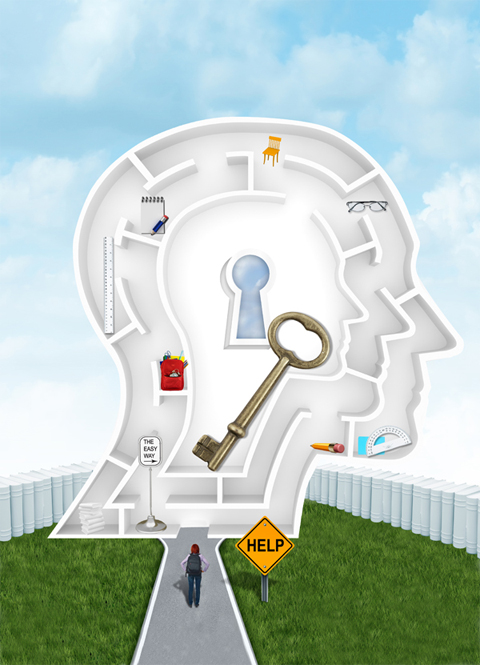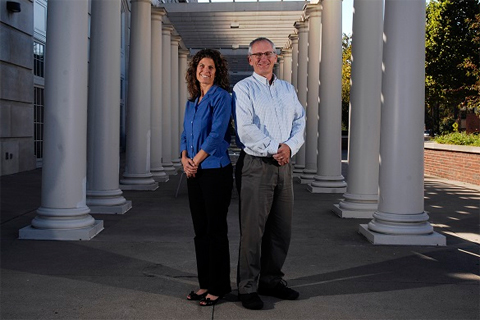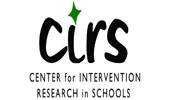 By Corinne Colbert
By Corinne Colbert
From Perspectives
She was a classic case of a child with attention-deficit hyperactivity disorder: A first-grader who impulsively pinched, shoved, and even bit her classmates. She failed to follow her teacher’s instructions and rarely completed her work.
Luckily, her teacher was part of a research project run by Ohio University’s Dr. Julie Owens, a faculty member with expertise in interventions for children with ADHD. The program prompted the teacher to set daily goals for the child, such as finishing a small percent of a worksheet, and provide feedback at key moments throughout the school day. At the end of the day’s classes, she showed the girl how well she had done toward meeting that goal, and the student received privileges that were based on her progress. It was a simple thing, but powerful.
“Once we implemented interventions with this girl, we saw that she responded,” Owens recalls. “She needed that structure and discipline.”
In fact, the girl’s behavior and performance improved so much that, by the next year, her second-grade teacher questioned her need for intervention.
Success stories like that demonstrate the potential of school-based programs that bring clinical psychology practices—positive reinforcement, setting goals, and feedback at the point of performance—out of the clinic and into the classroom. And some of the most compelling proof of that power is coming from Owens and her colleagues in the Department of Psychology in the College of Arts & Sciences at Ohio University.
“Only one in five kids who need mental health services end up in a clinic,” says Owens, associate professor of psychology. “Our services can be integrated into where they’re struggling: in peer groups or in class.
While counseling may help a child cope with having ADHD, the researchers say, it’s not as effective in improving behavior as behavior therapy, which is a set of techniques in which parents and teacher modify cues and reinforcements in the environment to produce behavior change.
“You don’t even have the same sense of what’s going on in the clinic—it’s based on what parents or kids tell you,” says Dr. Steven Evans, an Ohio University professor of psychology. “In school, you can watch kids in the hallway and cafeteria. It gives you the ability to appraise where they are and how they’re progressing.”
A national problem
According to the U.S. Centers for Disease Control and Prevention, some 6 million children between the ages of 4 and 17 have ADHD. Many of them also suffer from other mental health issues, such as depression, anxiety, oppositional defiant disorder, or bipolar disorder. Almost 3 million take medication; millions more seek help from community mental health providers.
The effects on the lives of children and their families can be devastating. Like the girl in Owens’ study, students with ADHD may be offensive to others or even violent, making it hard for them to make and keep friends. Their behavior disrupts the class and absorbs a disproportionate share of the teacher’s attention. In the long term, children with ADHD are at higher risk of school failure, suspension and expulsion, dropping out, as well as drug and alcohol abuse.
Under federal law, these children qualify for special services at school. But many teachers don’t know how to help those children, or are so overwhelmed by the various demands on their time that they don’t know where to start.
“In national surveys, nearly 50 percent of teachers say they didn’t get enough training in this area (behavior modification) in college,” Owens says
She and Evans are trying to change that by bridging the gap between counseling and teaching to give teachers the skills and support they need to more effectively guide students with ADHD.
 One example is Youth Experiencing Success in School (Y.E.S.S.) Program, launched after a Hocking County judge realized that he was seeing too many young people with behavioral issues in his court. In 2001, he contacted the Department of Psychology at Ohio University to ask for help. After consulting for a year with the judge and school personnel—and looking at clinical practices proven to help children with ADHD—Owens and her community partners developed Y.E.S.S., a school-based program to provide comprehensive support for elementary school children.
One example is Youth Experiencing Success in School (Y.E.S.S.) Program, launched after a Hocking County judge realized that he was seeing too many young people with behavioral issues in his court. In 2001, he contacted the Department of Psychology at Ohio University to ask for help. After consulting for a year with the judge and school personnel—and looking at clinical practices proven to help children with ADHD—Owens and her community partners developed Y.E.S.S., a school-based program to provide comprehensive support for elementary school children.
Y.E.S.S. puts mental health providers—Ohio University graduate students, professional school counselors, or school social workers—in each of the elementary schools in southeastern Ohio’s Logan-Hocking School District for at least 15 hours a week. They assess children with behavioral problems and develop individualized programs for use within the classroom. Parents and children alike meet with the clinicians individually, as well as in support groups; teachers get in-service training and meet with the clinicians on a bi-weekly basis for consultation and support.
The idea of linking clinicians directly to schools was (and to some extent remains) an unusual one; Y.E.S.S. was listed in the 2007 Registry of Innovative Practices maintained by the Annapolis Coalition on the Behavioral Health Workforce.
Based on her experience with Y.E.S.S., Owens is now collaborating with Evans and researchers at Florida International University to develop ways to help teachers better implement classroom interventions such as one known as the daily report card. It’s a technique in which a teacher identifies desired behaviors and goals for achieving those behaviors, and then gives feedback throughout the day on how well the student is doing in reaching those goals. Y.E.S.S. has shown that the report card works. But a variety of factors—demands on their time, amount of support from the school, lack of training—keep teachers from using it.
“We know there is variability in teachers’ implementation of interventions,” Owens says. “We’re trying to understand how we can better support teachers to help them overcome barriers to implementation.”
In a three-year project funded by the U.S. Department of Education, the Ohio University researchers and colleagues at Florida International University are working on ways to overcome those barriers. Last year, they consulted with teachers in southeastern Ohio and in Miami-Dade County to pinpoint roadblocks to implementation and steps to overcome them. This year, they are trying out those strategies in a pilot study. Next year, the Classroom Behavior Support Project will get a full clinical trial with 60 student-teacher pairs to see what works.
Following ADHD to Middle School
Owens’ work focuses primarily on young children, but ADHD and other emotional/behavioral problems are an issue for older kids, too. The American Academy of Child and Adolescent Psychiatry estimates that one or two teenagers in every classroom need help for ADHD. Some were never diagnosed as children; others continue to struggle.
Evans is one of the nation’s leading authorities on ADHD and other behavioral disorders in older children and teens. Owens recruited him to Ohio University in 2009 specifically to balance her expertise in younger children.
“The research questions are the same—it’s just different developmental stages,” she says.
Six months after arriving in Athens, Evans was awarded a $1.25 million grant from the National Institute of Mental Health for the Challenging Horizons Program, a five-year study of interventions for middle-school kids. The project involves more than 300 students in schools in Cincinnati, Columbus, Athens, Logan, and Lancaster.
The students were divided into three groups: One met with research staff for two hours after school twice per week. A counselor first helped them organize their backpacks, lockers, and notes. The teens work on academic skills, such as how to take notes, and interpersonal skills, such as learning how their behavior influences others’ perceptions of them. The sessions even taught the participants how to play games such as basketball so they can participate in recreational sports activities with peers.
A second group got the organizational and academic skills help, but provided by teachers during the school day. The third group received community-based counseling or other assistance, but not the CHP enrichment activities at school.
The project wrapped in June, and Evans is still crunching the data. But as early as 2010, data from other studies showed that CHP interventions made a big dent in the failure rate in sixth- and seventh-grade students. And in June 2013, Evans presented a paper at a conference in Belgium that showed that the most progress was made by teens in the after-school program.
“Those in the mentoring program had lesser gains, but both groups improved more than the control group,” Evans says. “The strength and consistency of the data are very encouraging.”
In fact, Evans worked with school personnel in schools in Cleveland to help them modify, implement and adopt the Challenging Horizons Program as part of their curriculum. Instead of attending an after-school program, students will go to CHP class to learn the skills that have proven to be so effective.
“We teach kids to read, and it takes two or three years,” Owens says. “It’s important to have the same approach to behavior control. For kids with ADHD, organizing and behavior are subjects to learn, just like reading or math.”
Programs like Y.E.S.S. and Challenging Horizons are not only effective, but also easy to implement. The school district in Cleveland doesn’t need to hire new personnel for the CHP class; it will be led by a teacher who used to oversee study hall. And Y.E.S.S. trains school counselors and teachers, who can keep it going.
“The work that Steve and Julie are doing is extremely valuable to both researchers and practitioners in the psychology and education fields,” says George DuPaul, professor and chair of the Department of Education and Human Services at Lehigh University. “They are developing effective interventions that are feasible for school personnel to use even without the resources that come with research projects.”
Meeting the Needs of Older Teens
Doctors used to think that children outgrew ADHD; now they know better. Increasing numbers of older teenagers and young adults are being diagnosed as psychologists and doctors learn more about the condition.
Those who are diagnosed in adolescence often have greater hurdles to jump: They may be friendless, having alienated their peers, and be written off by teachers as lazy or unmotivated because of their lack of academic and organizational skills.
To help, Evans worked with colleagues to organize the Center for Adolescent Research in Schools, which targets high school teens and addresses a broad range of emotional and behavioral problems, not just ADHD. The program is a collaboration between Ohio University, Lehigh University, and the University of Missouri, with additional research support from Miami University of Ohio, the University of Kansas, University of Houston, and the University of South Carolina.
In this five-year project, funded by the U.S. Department of Education, a comprehensive intervention program for teens was developed and refined through trial testing at eight high schools in five states. During the last two school years, the program was implemented in 54 high schools, where 12 students per school were followed to see how the interventions affected their social, emotional, behavioral, and academic performance.
As with all of these projects, CARS takes a multi-pronged approach, incorporating support and training for teachers; academic, social, and behavioral counseling for students; and parent education. Because it has so many components — social, academic, emotional — ADHD can’t be addressed in only one way.
“Quality care is not just, ‘Take this drug and use this intervention,’” Owens says. “It’s about how this intervention works for this kid, this family, this teacher.”
Making an Impact
Both Ohio University researchers emphasize that their work is not intended to cure ADHD—it can’t be cured—but to help students, teachers, and families cope with it and be successful. And they recognize that even the best interventions may not help some kids. But when they work, school-based programs can make a tremendous difference.
Evans recalls an eighth-grader he worked with, a young man who was on the verge of being expelled from school. In addition to his behavior problems, the boy was failing academically. “He had no binder; his locker was empty,” Evans says. “When he got a paper from a teacher, he put it in his pocket and then threw it away at the end of the day.”
By coordinating assistance with the boy’s teachers and his mother, Evans worked what might be termed a miracle. “By the beginning of the second semester, he had all his materials together and he was doing his school work,” he says.
Without the boy’s knowledge, Evans asked the principal to introduce a Most Improved Student award in the end-of-year assembly. And so the student who just months before was at risk of becoming a dropout statistic took his place on the stage next to athletes and star pupils.
“It was one of the biggest turnaround cases I’ve seen,” Evans says. “It took patience and persistence.”
The Center for Intervention Research in Schools
In 2012, the Ohio University Board of Trustees approved the creation of the Center for Intervention Research in Schools, which is led by Owens and Evans. Center status can help faculty researchers secure more funding, attract new graduate students and staff, aid recruitment of study participants, and raise the national profile of the university’s program.
Although the field of school-based interventions for ADHD has grown rapidly over the past 15 years, currently, there are fewer than half a dozen centers focusing on research and training in school mental health in the United States. Only two others are located in a clinical child psychology program.
“I can’t think of another program that has our focus on disruptive behavior disorders. Our group is really unique nationally,” Evans says.
The center helped Evans and Owens recruit two new faculty members to Athens last year. Brian Wymbs is interested in the effect ADHD has on family relationships into adulthood, and Fran Wymbs focuses on engaging families in clinic and school-based interventions.
“They were great hires—among the top candidates in the field,” Evans says.
This article appears in the Autumn/Winter 2013 issue of Ohio University’s Perspectives magazine.
Illustrations by Christina Ullman



















Comments